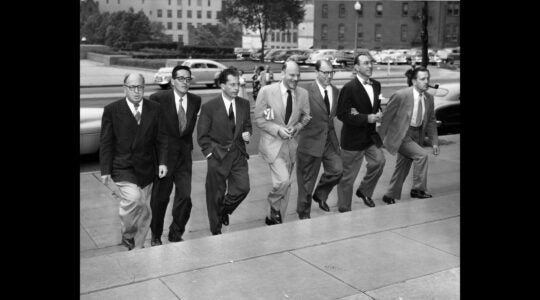Jerusalem — The long-anticipated haredi draft law, which passed the Knesset overwhelmingly on Wednesday, was built on the premise of “sharing the national burden.”
Beginning in 2017, the law sets a quota on the number of ultra-Orthodox males aged 21 and over who must serve in the IDF or perform National Service. If that quota isn’t reached by the 2016 registration deadline the government can impose criminal sanctions on the draft dodgers and their yeshivas a year later. Non-haredi dodgers are already subject to these sanctions.
The law immediately grants 30,000 yeshiva students between 22 and 28 an immediate exemption from IDF service, due to the 2017 draft date. Without the threat of being drafted, they can — for the first time — leave yeshiva and enter the workforce.
An additional 20,000 yeshiva students currently aged 18 to 22 will receive an exemption at the age of 24 provided they stay in yeshiva that long.
While Yair Lapid, the leader of the Yesh Atid Party that spearheaded the legislation, is hailing it as an important first step toward equalizing responsibility, many Israelis wonder if the draft law is actually the best way to integrate haredim into Israeli society.
Menachem Friedman, a member of Bar-Ilan University’s department of sociology and anthropology, believes the Israeli public is more interested in seeing haredim share the economic burden than in joining the army.
“Most Israelis want haredim to go to work and not live in poverty and on welfare,” Freidman said. “The public sees their numbers growing because the average haredi family has more than double the number of children as non-haredim. And every year, as the national budget continues to be cut, more haredim enter the scholar society” of full-time yeshiva study.
Friedman said there are “a lot” of young haredi men “who would like to go to work” but, because they haven’t studied secular subjects, “have very limited option for anything but low-income work. In my eyes, the revolution has to start in the schools,” not the army.
Momi Dahan, who heads the department of public policy at the Hebrew University, says that while budgetary considerations were the law’s main impetus, the principle of sharing the military burden is no less important.
“The motivation to serve in the IDF is a very delicate one” in Israeli society, “and when one group of Jews don’t have to serve, it makes those who do serve say, ‘Why should I if the other isn’t?’”
This is “especially important,” he said, “in a society where [haredim] are entitled to the same child allowances and public health care and services, and even some extra benefits, but were exempt from the military.
“Yair Lapid’s success was tapping into this dissonance between equal rights and unequal duties,” Dahan concluded.
If haredi men decide to serve it will not be because they feel this dissonance, Dahan emphasized.
“The main motivation will be economic. They want to acquire skills. They have to rent or buy a home, to feed their children.”
What many people don’t realize, Dahan said, is that in the 1950s and 1960s most haredim in Israel worked. It was only later that generous yeshiva stipends, child allowances and parental support enabled many to study in yeshivot full-time, but this past decade’s budget cuts have brought many haredi families to the poverty level.
“The parents who once supported this lifestyle for their children are themselves now poor,” he noted.
Kimmy Caplan, another Bar-Ilan University expert in haredi society, believes some haredi young men are willing to join the army, and that many are eager to join the workforce, especially now that work isn’t a punishable offense.
Due to the dearth of opinion polls in the sector, it’s impossible to know how many, he said.
Caplan advised Israelis not to draw conclusions from the haredi leadership’s vows to send their young scholars to prison rather than to the army.
“This is a society with a very strong sense of rhetoric, but you can’t buy into that rhetoric at face value. If this is similar to prohibitions against people having computers and Internet and smart phones, the gaps between what is prohibited and what people do in reality is big and clear.”
Caplan noted that “tens of thousands” of haredi women are currently employed outside the community.
“The reason is financial, but it’s had an impact on haredi society. They meet and come in contact with a gamut of Israeli society. They see and hear and it breaks down stereotypes both ways.”
While stressing that he is “no prophet,” Caplan very much doubts that large numbers of yeshiva students will want to sit in prison rather than do IDF service. Nor does he take any stock in haredi threats to emigrate from Israel en masse if the draft law is enforced.
“They are so financially dependent on the state that they have no options. There is no country in the world that will support their lifestyle. The truth is, this law is the best outcome they could come up with. It pushes the draft date beyond the current government, and a lot can happen politically in three years.”
That’s what Uri Regev, CEO of Hiddush: Freedom of Religion For Israel, is afraid of.
“Every element in the core makeup of the bill … will perpetuate inequality, starting with the fact that there is no obligation for haredim to serve until 2017. That means that the actual decision on whether and how to implement it will be in the hands of the next government, which could decide to overturn it.”
Regev fears that the next government will lower the number of haredi draftees “because the exact number is not etched in the law.”
He is also convinced that the law’s criminal sanctions for evading the draft will be useless.
“There is no way these will be implemented. You can imprison one defector or even 100, but you cannot do that with thousands, and anyone who thinks this is doable is living in Hollywood.”
Knesset member Dov Lipman, an American-born Orthodox member of Lapid’s Yesh Atid party and a strong supporter of haredi integration, called the law “a compromise.”
Speaking to Zev Brenner on his “Talkline” radio show, Lipman asserted that while the law pushes off service for three years, the decriminalization of going to work should help both the haredim and the Israeli economy.
“Letters will go out to 30,000 young men who until now could not go to work. The letter will say you can work, go support your families with dignity. It will help people leave the cycle of poverty,” Lipman said.
The New York Jewish Week brings you the stories behind the headlines, keeping you connected to Jewish life in New York. Help sustain the reporting you trust by donating today.




